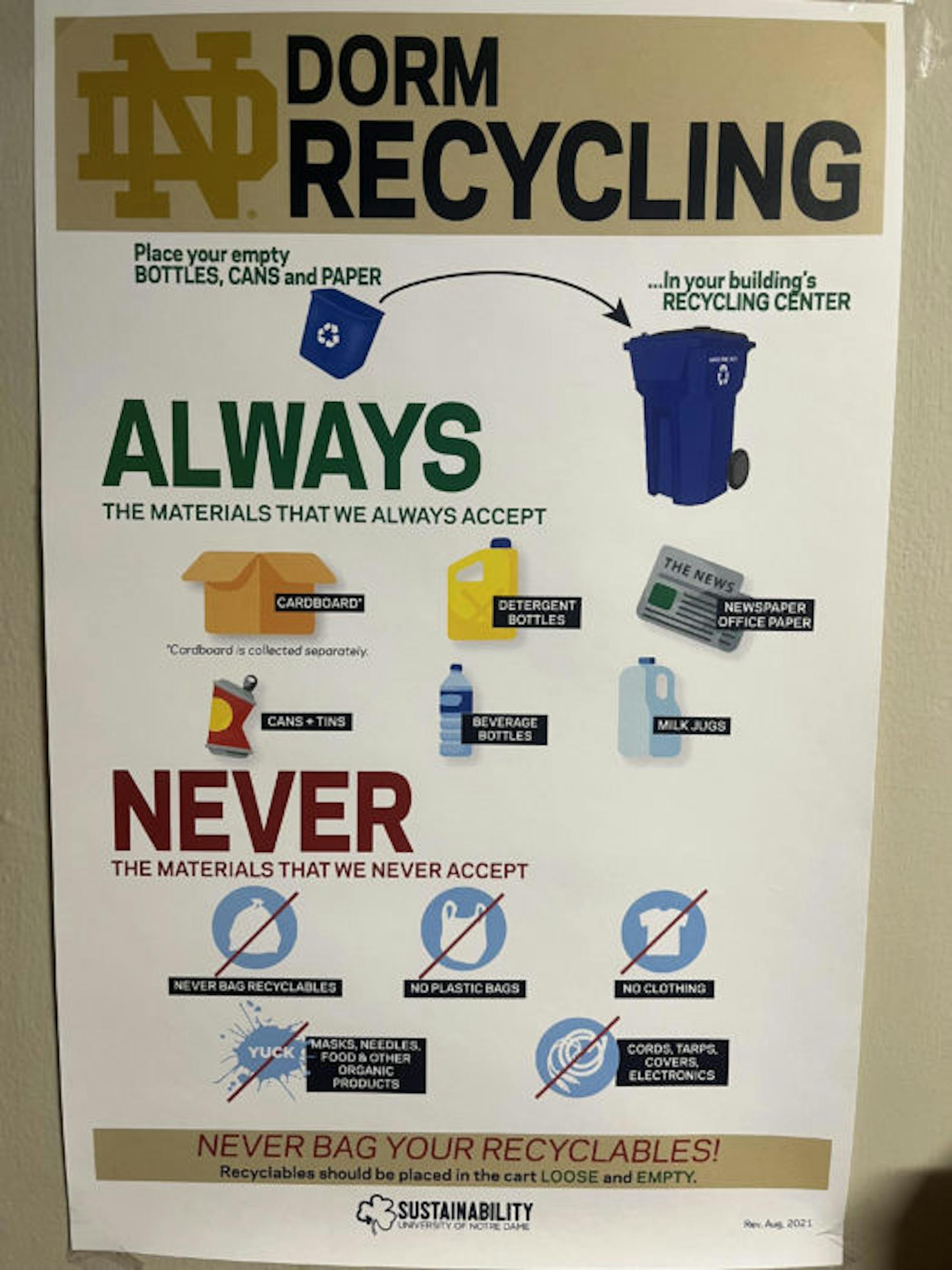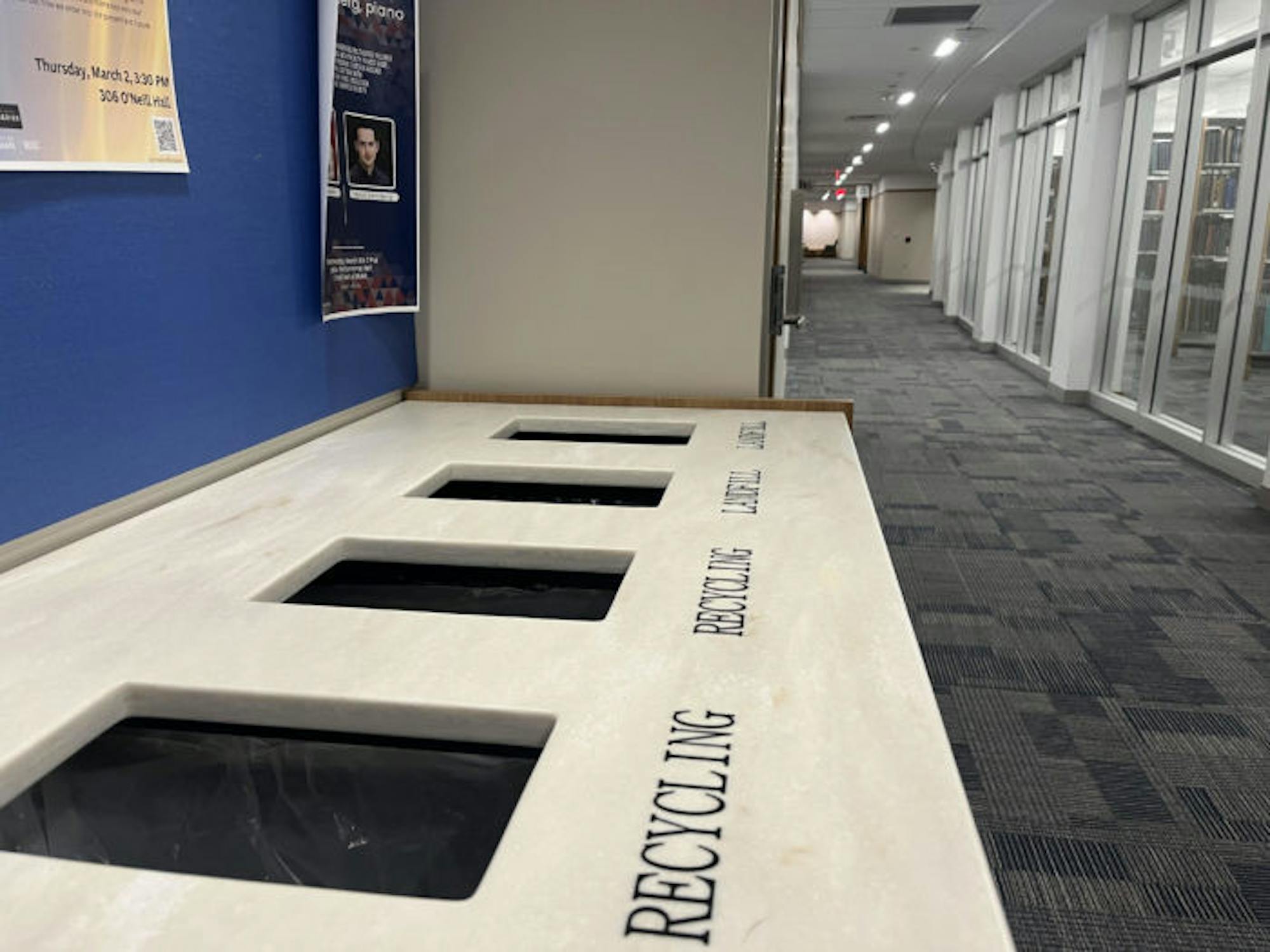Notre Dame still recycles, but don’t try recycle your red solo cup, even if you do at home.
The campus currently recycles using a blue cart and gray toter system, introduced by the Office of Sustainability and building services in early 2022.
Single-stream recycling, in which multiple materials can be recycled in a single load, should be placed in blue toters. At Notre Dame, this includes empty bottles, papers and clean cans, but not plastic bags, styrofoam or cups. Due to its large size, cardboard should be recycled in gray carts. More information about recycling the right way on campus can be found on the Office of Sustainability’s website.
People on campus can locate the blue toters and cardboard carts for dorms and other buildings online.
Five years of change for worldwide recycling markets
Senior director for sustainability Geory Kurtzhals said market shifts forced Notre Dame to change their standards and accept fewer materials for recycling.
“Over the last few years, sudden changes in both worldwide recycling markets and industry standards required the University to adapt its recycling program quickly to meet new on-the-ground conditions,” Kurtzhals said in an email. “Before these market changes, we were able to recycle a wide array of materials. As the market changed, we were no longer able to recycle as much.”
Back in late 2018, the Notre Dame made changes to its recycling system, including the “use of clear bags to support visual inspection,” according to Kurtzhals.
Throughout 2019, she said the Office of Sustainability continued to recycle, but some recycling shipments were rejected by the office’s then-vendor, Waste Management, due to a lower threshold of contamination being allowed in recycled materials.
In early 2020, the University paused single-stream recycling, but they didn’t pause specialty recycling of cardboard, scrap metal and wood. Then, in March 2020, the Office and building services piloted the blue toter and gray cart system, which was again paused as the University “essentially closed due to the pandemic,” Kurtzhals said.
The pandemic delayed the rollout of the new recycling system, but the initiative continued in the 2022 spring semester.
“Once COVID-related priorities were addressed, we were able to continue collaboration with a new vendor, Recycling Works, and continue to expand the previous pilot program with the blue toter/gray cart system in early 2022,” she said.
Though fewer materials are recyclable now, it is not clear exactly how Notre Dame’s campus recycling system has performed compared to its pre-2019 recycling programs.
“Because we have made changes to our data collection process, we’re unable to make valid comparisons,” Kurtzhals said in the email.
Communication issues

This stricter policy for recycled materials has posed problems for sophomore Hayden Kirwan, Stanford Hall’s sustainability commissioner. Kirwan’s responsibilities include coordinating sustainability events and educating his dorm members about pertinent topics on campus regarding sustainability.
Kirwan said his biggest challenge as commissioner has been getting students to understand the University’s recycling process.
“It seems the students have zero clue,” Kirwan said. “Even when we put fliers out, students still put the wrong things inside of the recycling bins,” he said. “And that largely is because the University’s recycling policies are so stringent.”
When a batch is contaminated — meaning that there is too much non-recyclable material in a blue toter — Kirwan said the entire toter gets dumped in the trash.
“If people put 60% of actual recyclable material and 40% not [recyclable], then none of it gets recycled,” Kirwan said. “And that includes that 60% that other people chose to recycle.”
Kirwan said that Notre Dame’s recycling system accepts a lot less material than students are used to recycling at home. Even with the help of posters, students’ prior recycling habits may be difficult or confusing to rewire.
“Students, when they get to Notre Dame, continue to recycle the same way they would at home, or just guess how, or what, they think should go in it, and don’t take the time to read the specific University policy,” Kirwan said.
Kirwan added, however, that he wasn’t blaming the University because “it’s understandable, since they’re simply contracting out recycling.”
Mislabeled “recycling” fated for the trash

Custodian Billy Gene Easton Sr. was not aware of any recycling program having been implemented in O’Neill Hall of Music, which he was recently moved to from his prior location in Flanner Hall. On the other hand, he said Flanner Hall did have a recycling program when he worked there. Easton, who has worked as a custodian at Notre Dame for four years, added that in meetings with other Building Services employees, recycling seemed to be dealt with in a way that was admirably responsible.
“I’m impressed with the way that they deal with a lot of issues here at Notre Dame. I enjoy working here. I get all the equipment that I need to do a good job, and I don’t know what they’re gonna do about the recycling part here in O’Neill Hall,” Easton said.
Despite no recycling actually being carried out in O’Neill Hall, however, containers labeled “recycling” remain. These containers are simply thrown in the landfill dumpster with the rest of the building’s trash, Easton confirmed.
For buildings like O’Neill Hall that have no recycling system set up, the Office of Sustainability does have a recycling toter request form available onlinefor staff, students and faculty to make requests to add recycling to their building or office.
Kurtzhals added in her email that the Office of Sustainability and building services are taking up several initiatives to raise awareness on campus about the new recycling system in order to improve its efficiency and decrease the number of contaminated bins on campus.
“There are a series of additional awareness items forthcoming,” Kurtzhals said. “Faculty and staff received the ND Works Quarterly publication last week which includes more information and you'll see asimilar article being published digitally... We are also working with different student-focused avenues to share this information, including the engagement opportunities.”
Editor’s Note: This story required several corrections. A previous version of this story incorrectly gendered Geory Kurtzhals. Due to confusion in the Notre Dame directory, it also stated that she is the senior director for the Office of Sustainability and vice president for campus safety. She works only for the Office of Sustainability, not for campus safety. For clarity, changes to the recycling program were made by the University in collaboration with both the Office of Sustainability and building services. The Observer regrets these errors.









